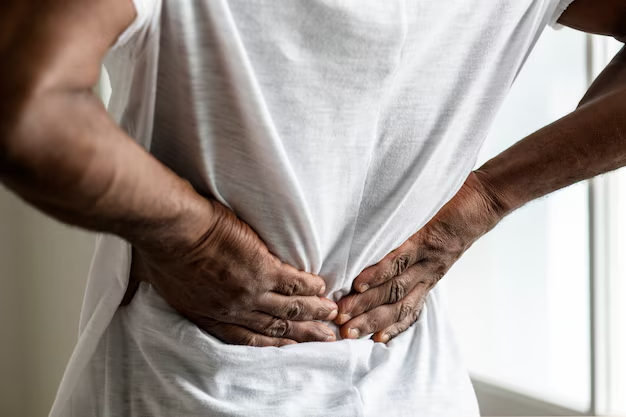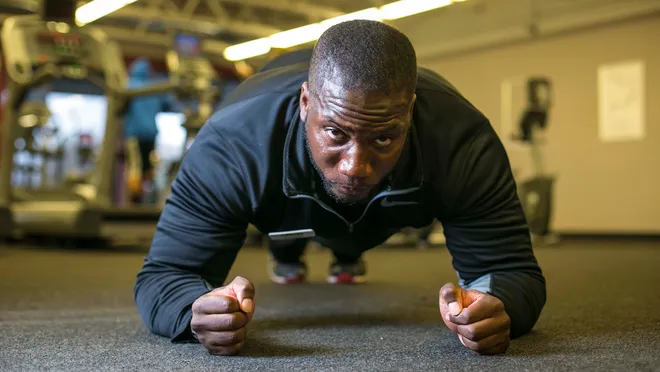Health Essentials
You have only one back, pamper it

Backpain is undoubtedly one of the commonest complaint
- Backpain is undoubtedly one of the commonest complaint
Whenever I get to attend to clients, backpain is undoubtedly one of the commonest complaints. Sometimes I wonder if it’s the norm or I simply attract people suffering from backpain.
Approximately 40 per cent of all people will complain of significant back pain some time in their life. About 95 per cent of these cases resolve spontaneously within six weeks. Most cases of back pain go away on their own after a few days but if yours lasts more than a week, see a doctor. Usually the pain will be due to muscle strain or ligamentous sprain which heals with time with or without treatment.
A small proportion of acute back pain may have significant, serious pathology as its underlying cause. Examples include fracture, neoplasm, infection or other conditions that adversely affect a nerve (e.g. a disc between vertebrae bulge or burst open and presses on a nerve such as the sciatic nerve).
Risk factors for back pain
• Obesity
• Occupation – sedentary workers and those who need to lift things or bend for hours
• Poor Posture- this includes how we sit at work and the awkward postures some of us adopt.
• Being out of shape – pot belly etc
• Smoking
• Genetics – vulnerable to scoliosis, spondylolisthesis etc
• Age – young athletes are prone to tiny fractures in the spine (spondylolysis). The aged are likely to have arthritis
• Psychosocial Issues – Depression, Anxiety, Stress
Diagnosing back pain
Some people complain of back pain after lifting heavy objects using an abnormal posture or sitting for long periods but several others may not remember any triggers.
Often the patient’s complaints and the doctor’s findings will clinch the diagnosis but your guess is as good as mine; the management/ treatment is usually the same.
Laboratory tests are often not helpful except for the few cases where infection or neoplasm is a concern.
X-rays are not indicated in most cases of back pain, especially within the first six (6) weeks. It may only become necessary when pain persists, or there is concern for fracture, neoplasm, infection or other serious condition. Other studies that may be helpful are, Bone Scan, CT Scan or MRI.
Managing back pain
The mainstay of management is:
• Bed rest for a short period of time usually not exceeding three days.
• Early mobilisation ensures quick recovery. Get moving, do not stay in bed indefinitely
• Lying on a firm surface is recommended but super hard mattresses may sometimes cause back pain
• Analgesics such as Brufen, Naproxen etc are useful but avoid if you have peptic ulcer or have bronchial asthma.
Other options for management include:
• Psychotherapy – many cases of back pain have been found to be linked to anxiety and depression
• Physiotherapy/Physical Therapy also has an important place
• Massage, Osteopathy and Chiropractic all play a role in relieving back pain
• Surgery may also be needed. Certain cases of back pain are surgical emergencies but for the majority, surgery may be a last resort. Though surgery may make the patient feel better quickly, the same can be achieved with physical therapy in the long term (Study in Journal of the American Medical Association) in most instances.
Need to see the doctor now – warning signs you can’t ignore
In general one may not need to see a doctor immediately with most brief episodes of back pain but if the following are associated with your pain then get to the hospital NOW!!!
• Extreme leg weakness
• Loss of bladder and/or bowel control
• Numbness or altered sensation in groin or rectal area
• Fever or sign of infection
• History of cancer
Living without back pain
• Stay fit – Exercise on most days of the week (www. healthclubsgh.com)
• Eat a balanced meal at the right times
• Maintain a healthy weight
• Cut out tobacco
• Take time off to relax
• Attitude – take charge of how you feel. Do not be too hard on yourself.
• Make sure you sit appropriately and take brief breaks after at most an hour and half of sitting.
Some exercises that may help to heal back pain
• Planks: Daily planks or at least doing this thrice a week may help protect your back. In the acute phase of backpain however most people are unable to do this.
• Wall slide: Slide up then down till your thighs form an angle of 90 degrees with the vertical wall. Repeat
• Pelvic tilt: Lie on your back with knees bent. Exhale and pull abdominal muscles in and up towards the ribs. You may also lift your buttocks of the surface and squeeze for a count of five and repeat.
• Bird Dog: Bend over on all fours, then raise opposite arm and leg parallel to the floor hold for a count of eight or ten then repeat. Change to the other arm and leg and repeat.
• Walking: This low cost exercise is a miracle worker. Lace your good boots and get walking.
Back pain is a major public health issue since it results in a substantial decrease in productivity and days lost from work.
Use the appropriate furniture at work and take occasional one-minute breaks to stand.
If you need to lift and bend, often make sure you learn the proper posture.
Do not wait for back pain to strike, start a healthy life style today!!!! Everyone has one back and one back ONLY. We need to take very good care of it. Simply pamper your back.
AS ALWAYS LAUGH OFTEN, ENSURE HYGIENE, WALK AND PRAY EVERYDAY AND REMEMBER IT’S A PRICELESS GIFT TO KNOW YOUR NUMBERS (blood sugar, blood pressure, blood cholesterol, BMI)
Dr Kojo Cobba Essel
Health Essentials Ltd (HE&W Group)
(dressel@healthessentialsgh. com)
*Dr Essel is a Medical Doctor with a keen interest in Lifestyle Medicine, He holds an MBA and is an ISSA Specialist in Exercise Therapy, Fitness Nutrition and Corrective Exercise. He is the author of the award-winning book, ‘Unravelling the Essentials of Health & Wealth.’
Thought for the week – 1. “The most efficient way to reach your realistic health goals, is to make small healthy choices daily.”
References:
1. WebMD
2. Mosby’s Ace the Boards
3. The Merck Manual
4. www.healthclubsgh.com
Health Essentials
At Easter should Spiritual Wellness be the only form of Wellness?

Many of us have already packed our Easter season with so much work and back-to-back programmes we hardly have time to breathe.
The little time we can squeeze out is used to stuff ourselves with food and drinks, but for this season and beyond we may be able to spend five minutes even on extremely busy days to make a difference in our lives so that we can have time to sing, dance and worship God as we remember his unparalleled sacrifice to us.
My-in-laws who reside on the mountain are busy trekking up and dragging their friends and colleagues with them. Any idea why the Kwahus revel in Easter? Has it always been that way or is it a conscious effort to show Ghana and the world what they have?
We all wish our favourite exercises will give us the same benefits as all other exercises but the truth is that some exercises are “more equal than others” just as happens in every aspect of life.
This does not mean if you are unable to perform the most effective exercises, you should exert yourself and cause injury to your body. Remember, Cobba’s First Law of Exercising is “DO NO HARM”.
These exercises may just help you stay afloat this Easter:
• Squats
• Plank
• Push-Ups
• Walking & Dancing
Squats
Every single rep (repetition) in this exercise is worth the effort.
Squats target the quadriceps, hamstrings and gluteals, which in simple language refers to the thigh muscles and buttocks.
It is important to learn the right technique and since it exercises large muscle groups, you are able to burn a lot of calories with squats.
In every exercise session, it is important to work large muscles before the smaller ones.
Steps
1. Keep feet shoulder width apart
2. Back should be straight (standing posture)
3. Bend knees and lower your rear till your thighs are horizontal.
4. Return to the standing position
5. Repeat steps 1-4
6. Remember to stretch the muscles used after the exercise.
If you have difficulty following the steps above, place a chair behind you and with your back straight try to sit on it. Do not let your buttocks touch the seat, then return to the standing position and repeat. As your technique improves, you may remove the chair.
As one gets stronger you may even carry some weights while doing squats but as always start with caution. You may do only 3 reps at a time (properly). Gradually, add some more.
When to avoid squats
• Severe knee pain irrespective of cause
• Knee injury even if no longer painful (you will need professional supervision)
• Acute back pain (you will later do back slides which is similar to squats and helps strengthen back muscles)
This exercise benefits almost everyone with a lifestyle disease. Hypertensives (those with high blood pressure) even get a bonus since it causes peripheral pooling of blood and helps to lower the blood pressure over time.
Plank

Arguably, the safest exercise for strengthening abdominal muscles and also has the added benefit of strengthening lower back muscles. Especially for people who sit for long hours (you shouldn’t anyway) this is great news for helping your back.
1. Start by getting into a push-up position
2. Bend your elbows and rest your weight on your forearms and not on your hands
3. Support your lower body on your toes
4. Your body should form a straight line from shoulders to ankles just like a plank of wood
5. Engage your core (midsection) by sucking your belly button into your spine
6. Hold this position for the prescribed time. This may vary from 5 seconds to 1 minute. Repeat.
Push-ups (press-ups)
This is probably the first exercise most people try out; well apart from laughter and walking I presume, and everyone is familiar with it.
Go ahead and squeeze a minute a day in there.
Walking & dancing
Before you set out to exercise your muscles remember to walk at least a minute before you start and a minute after you are done.
You may even walk while in one place, what matters is moving your legs and arms and getting your heart to pump.
Use every opportunity during the day to:
• use the stairs instead of the elevator
• walk while you talk on your cell phone
• Walk to a colleague’s desk at the office instead of using the phone or sending someone else.
• Pick your own stuff for cooking instead of sitting and getting people to assist with even the trivial errands
• Dance with your heart whenever you have a chance; during your Christmas programmes, while watching TV and even while you take a shower.
A minute each for Squats, Planks and Push-ups and two minutes of walking every morning, afternoon or evening may just be enough to get you through the season and certainly it will not tamper much with your tight holiday schedule. Do not forget to smile often, breathe deeply to relax, enjoy some sunshine, pray, praise and worship God and you will be on the right path especially if you keep an eye on your finances and learn to unplug several hours each day.
In my opinion, every aspect of Wellness is important at all times and we should try to keep a balance. Neglecting all other aspects (Physical, Social, Mental, Digital, Financial & Spiritual) and focusing only on Spiritual Wellness will mean we will not be able to perform at our very best and certainly our Maker needs the best version of us.
AS ALWAYS LAUGH OFTEN, ENSURE HYGIENE, WALK AND PRAY EVERYDAY AND REMEMBER IT’S A PRICELESS GIFT TO KNOW YOUR NUMBERS (blood sugar, blood pressure, blood cholesterol, BMI)
Dr Kojo Cobba Essel
Health Essentials Ltd/ Medics Clinic
(dressel@healthessentialsgh. com)
*Dr Essel is a Medical Doctor with a keen interest in Lifestyle Medicine, He holds an MBA and is an ISSA Specialist in Exercise Therapy, Fitness Nutrition and Corrective Exercise. He is the author of the award-winning book, ‘Unravelling The Essentials of Health & Wealth.’
Thought for the week – “For heart health you need to relax and have fun as well; schedule time for leisure, sing praises to God, laugh often, learn to breathe deeply and maybe get a pet.”
References:
• The Gym Bible
• www.webmd.com
• 30dayfitnesschallenges.com
By Dr Kojo Cobba Essel
Health Essentials
Hijab (Islamic Veil) as an Act of Worship
Alhamdulillah (all praise is due to Allah), the Creator of the heavens and the earth, the One who guides us to the straight path.
We bear witness that there is no deity worthy of worship except Allah alone, and we testify that Muhammad (peace and blessings be upon him) is His servant and Messenger.
May Allah’s peace and blessings be upon him, his family, and all who follow him in righteousness until the Last Day.
Introduction
Dear respected brothers and sisters in Islam, today’s khutbah addresses an essential act of worship that embodies submission, modesty, and obedience to Allah: the “Hijab”.
While the Hijab is an explicit command from Allah, it is also a human right protected under local and international laws.
It is imperative that Muslim women are allowed to observe Hijab freely, especially in public institutions such as universities, banks, ministries, public health institutions, and government agencies.
Definition and Meaning of Hijab
In Islam, Hijab refers to modesty in appearance and behaviour. For women, this includes covering the body, except for the face and hands, in non-revealing clothing (not skin-tight), while for men, it includes covering from the navel to the knees and dressing modestly.
The Hijab extends to lowering the gaze, avoiding indecent speech, and conducting oneself with dignity.
Allah commands:
“And tell the believing women to lower their gaze and guard their private parts and not to display their adornment except that which [ordinarily] appears thereof and to wrap [a portion of] their headcovers over their chests.”
(Quran 24:31).
Essence of Hijab as an Act of Worship and Modesty
The Hijab is an act of worship rooted in obedience to Allah. It is not a cultural practice but a divine command. Allah says:
“O Prophet, tell your wives and your daughters and the women of the believers to bring down over themselves [part] of their outer garments. That is more suitable that they will be known and not be abused. And ever is Allah Forgiving and Merciful.”
(Quran 33:59).
The Hijab is a reflection of one’s faith, modesty, and inner character. It shields the individual from immorality and contributes to the moral fabric of society.
Lowering the Garments and the Gaze
The Hijab also encompasses lowering the gaze and maintaining purity in interactions between genders. Allah says:
“Tell the believing men to lower their gaze and guard their private parts. That is purer for them. Indeed, Allah is Acquainted with what they do.” (Quran 24:30).
By lowering the gaze, both men and women protect themselves from sin and maintain mutual respect.
Social Menace and Immoralities Due to Lack of Hijab
The absence of Hijab in society has led to numerous social issues, including:
Zina (Adultery and Fornication): Unrestricted interactions and immodesty increase the likelihood of adultery and fornication, which Allah explicitly prohibits:
“And do not approach unlawful sexual intercourse. Indeed, it is ever an immorality and is evil as a way.”
(Quran 17:32).
Exploitation and Objectification:
When modesty is neglected, individuals, especially women, are objectified and exploited, resulting in an increase in harassment and sexual abuse, a phenomenon that has plagued many organissations such as Universities, Banks and other public institutions. The introduction of Sexual Harassment Policies with its attendant harsh punishments has done very little in resolving this menace.
By Imam Alhaji Saeed Abdulai















